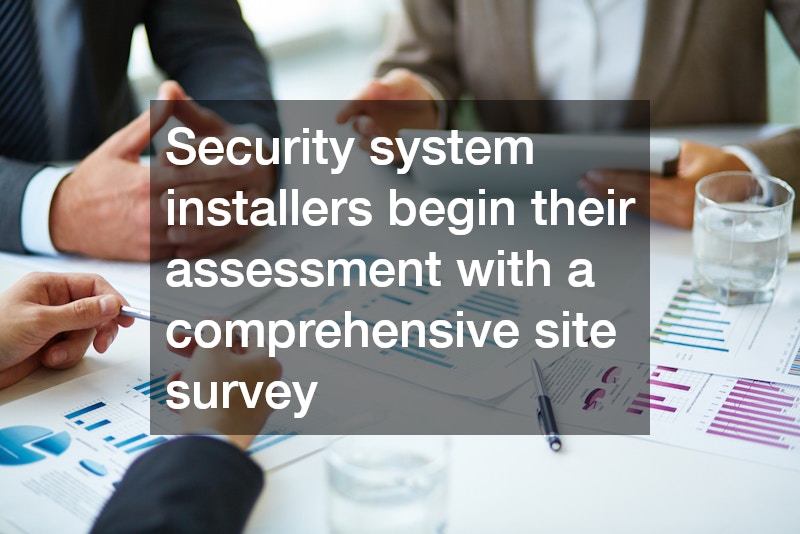Explore the vital role that security system installers play in safeguarding your business premises, assets, and personnel.
The Main Types of Security Systems
In the business landscape, security is paramount. Various security systems are designed to protect physical spaces and digital assets.
Alarm systems serve as a frontline defense against unauthorized intrusion or emergencies. Surveillance cameras monitor activities, deterring potential threats while providing invaluable evidence in the event of an incident.
Access control systems allow businesses to enforce restrictions, ensuring that only authorized personnel can enter specific areas. These systems can range from simple keycard access to sophisticated biometric scanners. Many businesses also opt for integrated solutions that combine multiple security functions into a cohesive system.
Furthermore, the evolution of technology has led to advanced security measures such as smart systems that can be managed remotely. These innovative systems not only enhance safety but also improve operational efficiency. Understanding these different types of security systems is the first step in selecting an appropriate solution for your business’s unique needs.
The Security Needs of a Business
Security system installers begin their assessment with a comprehensive site survey. This process involves evaluating the physical layout of the business premises, identifying vulnerable entry points, and analyzing risk factors unique to the location. Installers also consider previous incidents and the specific security concerns expressed by the business owner.
Additionally, risk assessments are conducted to pinpoint potential threats and vulnerabilities that could affect business operations. This includes evaluating not only physical security risks but also assessing the technology in use and its potential weaknesses. The goal is to develop a tailored security plan that addresses all identified risks effectively.
Throughout this assessment phase, communication plays a critical role. Security professionals work closely with business owners to ensure that the proposed solutions align with the company’s operational requirements and budget constraints. Once the assessment is completed, a customized security strategy is recommended to enhance the business’s overall safety profile.
The Benefits of Professional Installation
One of the primary benefits of a professionally installed security system is the expertise that installers bring to the table. Their knowledge ensures that the security solution is appropriately designed, configured, and implemented to meet the specific requirements of the business. This can significantly enhance the effectiveness of the system.
Moreover, compliance with local regulations and industry standards is another area where professional installers provide invaluable support. They ensure that the security systems not only meet legal obligations but also adhere to best practices for maximizing security. This aspect is crucial in avoiding legal repercussions that could arise from inadequate security measures.
Finally, having security systems installed by professionals provides business owners with peace of mind. Knowing that trained experts manage the installation means that business owners can focus on their core operations without concerning themselves with potential security issues. This assurance is invaluable in today’s unpredictable business environment.
The Installation Process and What to Expect
During the installation process, businesses can expect a structured approach that prioritizes minimal disruption to daily operations. Professional installers typically begin by preparing the site, ensuring all necessary materials are on hand. This preparation sets the stage for a seamless installation process.
The actual installation includes mounting equipment, establishing connections, and configuring software systems. Installers will also test the system thoroughly to ensure everything is functioning correctly and meets the expected security standards. Communication is key during this phase as installers may need to coordinate with business staff for access to various areas.
After installation, a walkthrough is often conducted to demonstrate how the systems work. Businesses can expect follow-up support to address any questions or concerns that may arise post-installation. This comprehensive approach ensures that the business is fully equipped to utilize its security system effectively.
The Maintenance Required Post-Installation
Post-installation maintenance is vital to ensure that security systems remain effective over time. Regular inspections help identify and resolve any potential issues before they become serious problems. Businesses should establish a routine maintenance schedule that aligns with their operational needs and the type of security system in place.
Furthermore, software updates play a crucial role in maintaining the integrity of security systems. Many security systems now include digital components that require periodic updates to protect against new vulnerabilities. Keeping software current enhances the resilience of the security system against potential breaches.
Training staff on the proper use and troubleshooting of security systems contributes significantly to their longevity and effectiveness. Staff education ensures that the system is used correctly, reducing the risk of accidental malfunctions. This holistic approach to maintenance can greatly enhance the life and functionality of the installed security systems.
Investing in professional security system installation is crucial for protecting your business. By understanding the role of installers and the systems available, business owners can make informed decisions to enhance their security. Such investments not only safeguard assets but also foster a secure environment conducive to business growth and employee confidence.
